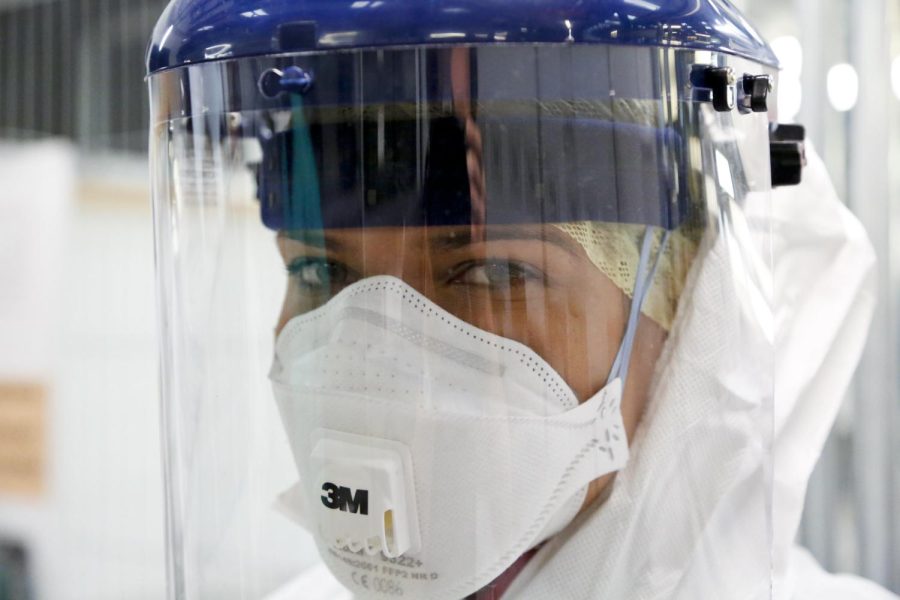Covid-19 causes nursing shortage
New face of nursing: personal protective equipment donned by medical personnel is the new uniform in the fight against covid. photo by pixabay
February 12, 2022
Chaos erupts with workers in hazmat suits and full PPE filling every corridor. This is something usually found in a sci-fi horror film, but it has become the reality for medical professionals in hospitals around the nation.
The first known case of Covid-19 reported by an Illinois hospital was on Jan. 24, 2020. Within months, hospitals and healthcare workers became overwhelmed with patients.
According to the Illinois Department of Public Health, by May 9, 2020, there were 76,085 known cases. By Nov. 15, 2021, there were 1.74 million cumulative known cases.
Initially, the hospital staff focused on the medical aspect of saving lives. Though medical professionals are accustomed to losing patients, they were not prepared for the mental toll attached to seeing the magnitude of lives lost.
As of Nov. 15, 2021, 26,117 Illinois residents have died due to Covid complications. The primary caregivers in hospitals, nurses have been hit especially hard.
“In the beginning I was caring for a patient who was dying, and the wife called me and asked if I could hold his hand when he took his last breath, said Veronica Maldonado, a nurse at Advocate Christ Medical Hospital. “We cried together.”
The mental toll of the pandemic on nurses has launched the shortage to worsen at alarming rates.
According to healthline expert Yasemin Nicola Sakay, almost 1 in 5 healthcare workers in the United States have quit their jobs since February 2020.”
Mental health symptoms began to increase among healthcare workers throughout the pandemic. University of North Carolina psychology professor Dr. Wizdom Powell, is seeing an uptick in the number of professionals exhibiting post-traumatic stress disorder (PTSD)-like symptoms.
“As a psychologist, I see a newer form of depression presented in the clinic: depression mixed with some anxiety,” Powell said.“The disconnection from the day-to-day work, the sense of watching your body from the outside and watching it all take place… [W]hat I’m observing is them feeling a little bit frayed at the edges, while at the same time so motivated to stay in the firefight.”
Armando Bustamante, a nurse at Advocate Christ Medical Center in Oak Lawn, worked throughout the pandemic-lockdown and watched as it affected his coworkers.
“I was tempted to leave the hospital setting due to the pandemic,” Bustamante said. “I do believe this led to the nursing shortage. Nurses that did not want to work with COVID patients did end up leaving.”
Due to the shortage of nurses in hospitals, current nurses are being requested to work on units that differ from their expertise. This has led to even more stress within the workplace.
“Many hospital employees were asked to move from their usual departments and roles to assist with the intensive care of COVID-19 patients,” cites a University of St. Augustine Study.
The change in work environment compelled some nurses to quit
“Nurses who are working short staff are now leaving,” Bustamante said.
The shock and concern of the pandemic set off the initial departing streak, then the lack of current and new employees continued to affect the number of nurses in hospitals.
Nursing shortages cause a greater amount of errors increasing morbidity and mortality rates. It is encouraged for nurses to have 1 on 1 care to decrease the number of miscalculations in patient care.
According to the American Nurse Association of Illinois,“The nurse-to-patient ratio went from its recommended 1:1 to 1:4.”
Patients are not always given the best care possible due to nurses being unable to perform at their full capacity.
According to NPR.org science desk correspondent Yuki Noguchi, “The crush of work and burnout among healthcare staff had a direct impact on patient care.”
Currently, the medical field is depending on the younger adults to populate the nursing community and minimize the chaos in hospitals.
Joining the nursing profession is no longer an optimal career goal, and in a survey of 112 North students, only 33 percent indicated an interest in becoming a nurse.







